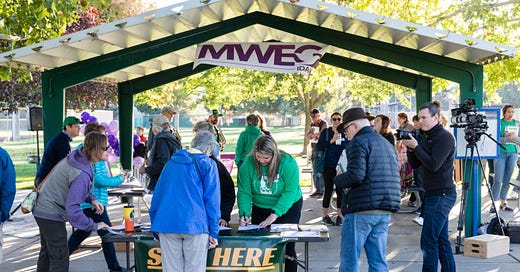Is Prop 1 Legal?
The AG's attempt to remove Prop 1 from ballot fails, but legal questions remain
The court has not been friendly to the Idaho Attorney General with respect to Proposition 1 - the initiative which made it onto the ballot this November and that will make significant changes to Idaho elections if it passes.
To date:
Ballot Title Issue - The Attorney General is tasked with reviewing all initiatives then assigning ballot titles for each initiative. This took place last summer and the AG used the term ‘non-party blanket primary’ to describe the initiative. That drew the ire of the Idahoans for Open Primaries who sponsored the initiative. They sued to have the ballot titles changed. Though they were largely successful in the suit, they ultimately agreed to use ‘Top 4 Primary’ in the ballot title and replaced all references that originally described the initiative as ‘open primary’.
Idaho Supreme Court Dismissal - Last month, the Idaho Supreme Court dismissed the AG’s original suit on procedural grounds. The AG filed suit on two issues. First, that the signature collection process for the initiative was misleading. The Court ruled that suit must first be taken up by a lower court. The second issue was the violation of the single subject requirement for initiatives. The Court said it would not rule on that unless the proposition passes.
District Court Dismissal - The AG refiled suit on the misleading signature collection in District Court, and that was dismissed as linked above.
Even if Proposition 1 passes in November, here are some legal questions that may still need to be litigated:
Does Prop1 Violate the US Constitution?
A primary is the nomination process of a political party to select its candidates. In 2007, the Idaho Republican Party (IDGOP) adopted a rule to close its primary, meaning only registered Republicans could vote in its primary. This triggered a debate as to whether the Secretary of State has to follow the rules of a political party or Idaho statute. The Secretary of State ignored the IDGOP rule and was subsequently sued by IDGOP.
The court case was settled in favor of IDGOP and legislation was hurriedly passed to bring Idaho statute in line with the ruling (HB351).
Key to that case was the US Supreme Court case of Jones vs Democratic Party of California. That case resulted in the decision that political parties have a 1st amendment right of association and can therefore decide who is or is not a member of the party. In other words, political parties have a right to close their primary.
Are there reasons why this would no longer be the case in Idaho and its GOP? Does Prop 1 cut against settled USSC law?
Does Prop1 Violate State Constitution Article III.16?
This challenge was part of the original lawsuit filed by the Attorney General. The clause referenced is known as the ‘single subject’ rule whereby legislation is to stick to a single subject. The AG’s argument is that since the proposition changes both the primary and the general election, it violates the single subject rule. The proponents of Prop1 claim that the entire matter deals with a single subject - ‘elections’.
The Idaho Supreme Court decided that it would not make a decision on this case until after the November election if it passes.
Does Prop1 Violate State Constitution Article IV.2?
Here is a screen shot of Article IV, Section 2 of our State Constitution. This relates to the seven statewide executive offices (Governor, Lt. Governor, Attorney General, Secretary of State, Treasurer, Controller and School Superintendent):
The language seems pretty clear that ‘highest number of votes’ wins. There is no exception that they also have over 50%. Prop 1 would instead require over 50% and use ‘ranked choice voting’ (RCV) to determine the winner. Now, this does not apply to the legislative or county offices, but what confusion will it cause to have some races use ranked choice voting while others do not? And if ranked choice voting and top4 primaries are inextricably linked as one topic, does this also invalidate the top4 primary for these state offices?
Does Prop1 Violate State Constitution Article III.19?
Article III, Section 19 (covering the legislative branch) states: “The legislature shall not pass local or special laws in any of the following enumerated cases, that is to say: …Providing for and conducting elections, or designating the place of voting.”
What does this mean? Is this granting counties the right to run their own elections? Several municipalities implement ‘majority voting’. That is, if no candidate gets over 50%, a runoff election is held with the top two ‘vote getters’ to determine the winner. Counties are not precluded currently from using the same type of voting, however, runoff elections are expensive and require additional time. However, does Prop 1 illegally infringe on the counties right to run their own elections?
Combined with the violation of Article IV, this could invalidate Prop 1 from being used in county and municipal elections. That would mean only the federal elections of US Representatives and US Senators would be impacted.
In summary, if Prop 1 passes in November, several legal questions remain to be answered.





